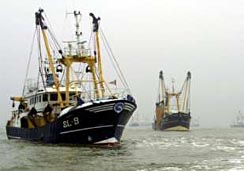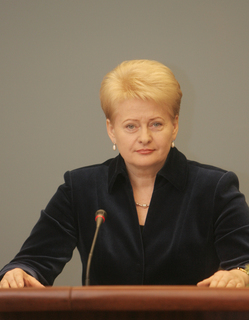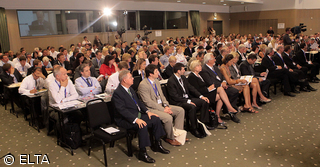The stability of Moldovan national currency the leu and that of the rate of inflation are mainly due to remittances sent home by Moldovans working abroad
Published:
28 June 2003 y., Saturday
IMF representatives have said Moldovans send home about 500m dollars annually, which is larger than the state budget. According to the fund's experts, Moldova will face serious financial problems if this money stops coming, given the fact that there is no foreign investment.
Marta Castello-Branco, the IMF mission chief said that the impact of remittances on the Moldovan economy is great. They contribute to stability of the leu's exchange rate and the control of inflation and they allow the economy to grow. But the problem is that this money only puts off some problems.
According to Marta Castello-Branco, the amount of direct investment in the Moldovan economy is very small and the investment climate should be improved. She said that if remittances stopped coming, Moldova would face serious problems. The authorities have previously estimated that Moldovans working abroad send home 230m [dollars], but these calculations were based only on official transfers. National Bank of Moldova's officials had previously said that this money did not significantly influence the domestic currency market.
Šaltinis:
BBC Monitoring
Copying, publishing, announcing any information from the News.lt portal without written permission of News.lt editorial office is prohibited.
The most popular articles
 A specific EU budget line for the new EU stabilisation mechanism should be created as soon as possible, to ensure its credibility, Council, Commission and Parliament negotiators agreed at a three-way meeting on Wednesday.
more »
A specific EU budget line for the new EU stabilisation mechanism should be created as soon as possible, to ensure its credibility, Council, Commission and Parliament negotiators agreed at a three-way meeting on Wednesday.
more »
 New EU rule will help phone-users avoid astronomical bills for web-surfing and downloads abroad.
more »
New EU rule will help phone-users avoid astronomical bills for web-surfing and downloads abroad.
more »
 The Communication approved today by the Commission builds on the principles presented on 12 May to reinforce the economic governance in the European Union.
more »
The Communication approved today by the Commission builds on the principles presented on 12 May to reinforce the economic governance in the European Union.
more »
 Eurostat report just published shows that the crisis has brought some lower taxes.
more »
Eurostat report just published shows that the crisis has brought some lower taxes.
more »
 New legislation is needed to ensure fair returns to farmers and transparent prices to consumers, by enforcing fair competition throughout the food supply chain, said Agriculture Committee MEPs on Monday.
more »
New legislation is needed to ensure fair returns to farmers and transparent prices to consumers, by enforcing fair competition throughout the food supply chain, said Agriculture Committee MEPs on Monday.
more »
 Fish imports play a crucial role in supplying the European market, yet fisheries and aquaculture are strategic sectors that do not lend themselves to a purely free-trade approach, believes the EP Fisheries Committee.
more »
Fish imports play a crucial role in supplying the European market, yet fisheries and aquaculture are strategic sectors that do not lend themselves to a purely free-trade approach, believes the EP Fisheries Committee.
more »
 I will support every proposal that strengthens cooperation among the European Union's Member States and serves Lithuania's interests," President of the Republic of Lithuania Dalia Grybauskaitė said at the meeting with EU Member States' ambassadors resident in Lithuania.
more »
I will support every proposal that strengthens cooperation among the European Union's Member States and serves Lithuania's interests," President of the Republic of Lithuania Dalia Grybauskaitė said at the meeting with EU Member States' ambassadors resident in Lithuania.
more »
 The fourth World Lithuanian Economic Forum “High tech innovation & investment: local to global” will start in London on 22 June.
more »
The fourth World Lithuanian Economic Forum “High tech innovation & investment: local to global” will start in London on 22 June.
more »
 Lithuania aims for the five Nordic countries and three Baltic States to become single community of values, which would be linked by a versatile quality of democracy, security and everyday life.
more »
Lithuania aims for the five Nordic countries and three Baltic States to become single community of values, which would be linked by a versatile quality of democracy, security and everyday life.
more »
 MEPs decided on Wednesday to create a special committee to prepare for the EU's next long-term budgetary framework.
more »
MEPs decided on Wednesday to create a special committee to prepare for the EU's next long-term budgetary framework.
more »